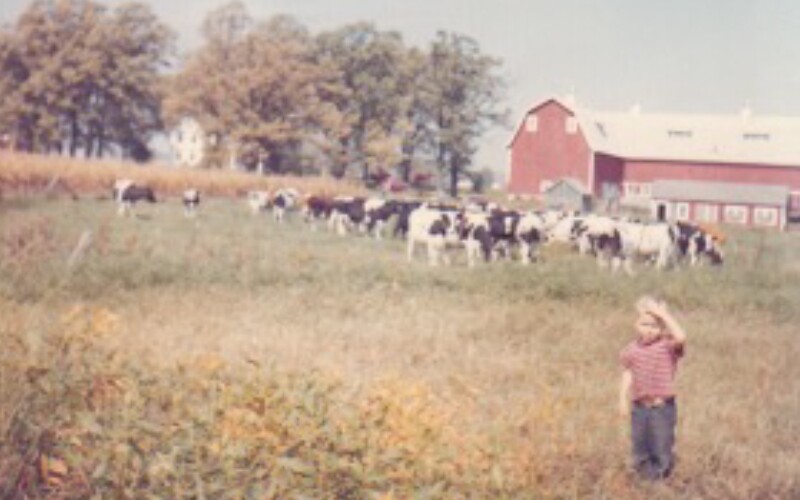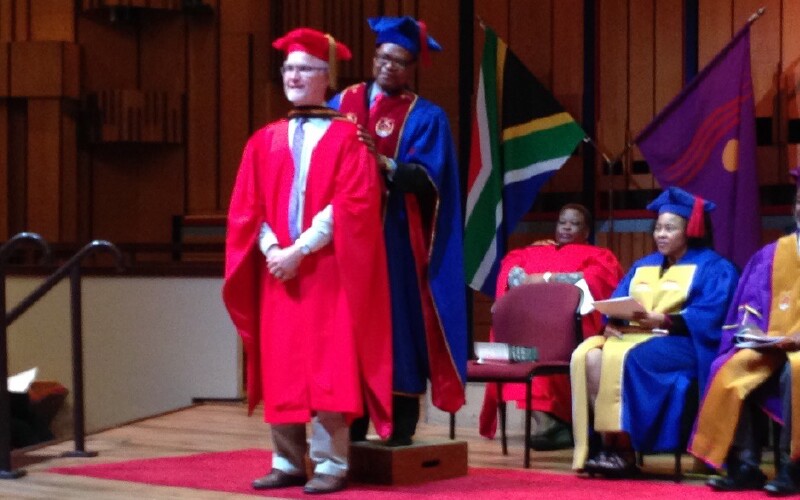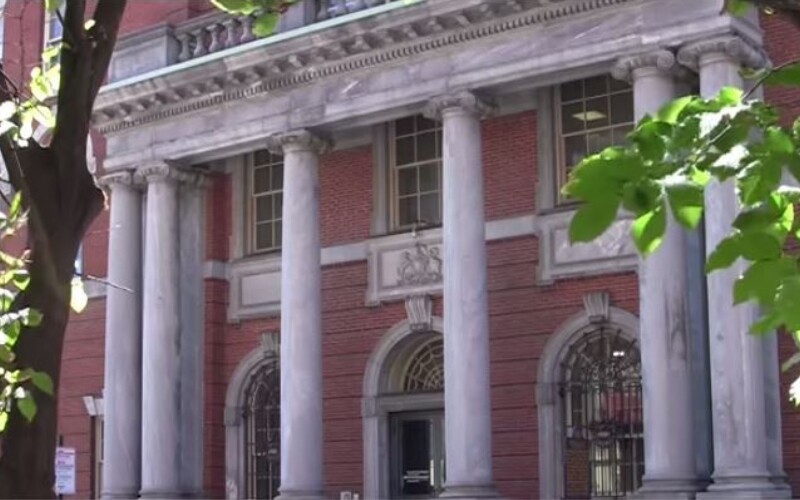Many people have come to know Lee Arnold through his work with the Historical Society of Pennsylvania, where, after 30 years, he recently retired as both the Chief Operating Officer and Senior Director of their Library and Collections. He has been with the society since 1992. Before then, though, Lee experienced family hardships, remarkable family history discoveries, exceptional educational programs, and an exciting encounter with an ostrich.
Lee shared some of his humble conditions growing up in Edgerton, Wisconsin. “We had a dairy and tobacco farm, and life was good,” said Lee. However, an unfortunate change in his family's circumstances caused them to leave the farm and resettle elsewhere in the community.
Lee explained, “The bank foreclosed on the farm after Dad got cancer. We bought a small place located 5 miles away. We were able to get 16 acres—just enough to feed the horses. We kept the horses and we lived in a trailer with 6 people. Dad then took a factory job.”

Taking a Personal Interest in Family History
While growing up, Lee did not know very much about his ancestors, but he developed a desire to search out his own family tree while in college. “I was curious,” said Lee, but he was only able to get bits and pieces from his parents as they didn’t want to provide too much information.
“Mother didn’t share; it was just something they didn’t talk about.”
Despite this, Lee did learn that his mother’s ancestors migrated from Germany to Wisconsin, where they continued to speak their native language. Lee stated, “Mother only spoke about her parents and grandparents with almost no genealogical details. And Dad, well, he made things up—said things that just were not true.”
While at college, Lee obtained a paperback book about how to trace family history. “I then spent every Saturday in a local library reading census records.”
Through this effort, Lee was able to connect with distant relatives and find more information about his family. Later, when Lee obtained a job at the Historical Society of Pennsylvania in 1992, he was able to take advantage of their collections. “I learned that I was the first Arnold family member to set foot in Pennsylvania. I found my folks in South Carolina and Tennessee.”
Finding a French Connection
Through the years, Lee developed a great interest in France and even studied the French language. As his interest in France intensified, he became determined to find an ancestor from France within his own lineage. “I knew that there had to be a Frenchman in the line somewhere.”
At first he looked and looked to no avail. Then, he entered the names and vital statistics of some of his ancestors into FamilySearch at his library. Before long, he was able to connect his known family tree to additional records and greatly extend his family tree. “The generations began flowing into my own tree.”

And voila! Lee discovered that he did indeed have French ancestry through Count Arnoul de Reynell who lived from 990–1052 AD. Lee counted the generations in his new FamilySearch tree and calculated that Count Arnoul de Reynell is his 28th great grandfather. Finally, he had found his long-sought-for French ancestor. And it became even more exciting when Lee discovered that Count Arnoul de Reynell’s chateau was still standing.
Genetics Help Find His Scandinavian Heritage
Having identified his French family, Lee also had a desire to see if he had any Scandinavian ancestry as well. “I still want to be a Viking,” he admitted.
Lee turned to DNA testing for help. Lee further stated, “I want to figure out what is going on in me, the deep DNA. That is my dream, to find something else to be proud of.”
DNA testing revealed that Lee’s ancestry is 40% Scandinavian. Now having discovered his strong Scandinavian ties, Lee enjoys attending local Scandinavian events.
Moving Forward
Although Lee had humble beginnings, he turned to education to make his future. He first attended Edgewood College and received a bachelor’s degree in May 1982, followed by a Master’s degree from the University of Wisconsin in December 1987.
Shortly after he completed his Master’s degree, he was hired as an acquisition librarian at Princeton University in New Jersey. As Lee took on the administrative duties of the business office, he knew he wanted something else.
“I always wanted to be a library director,” he said. With his background and a bigger dream, he applied for a position at the Historical Society of Pennsylvania. He received the job, and the rest is history.
A Doctorate Degree from South Africa
Once Lee heard an actress speaking Afrikaans. Lee loves learning about different languages. so he searched online to find out how he could learn that language, too. During his research, the University of South Africa came across his radar. As he probed deeper into the university’s curriculums, Lee was amazed and thrilled to find out that the school offered a doctorate degree in archival science. It was a perfect fit for Lee to participate in this program. After 4 years of online study, he achieved his doctorate degree.

Upon earning the degree, Lee traveled to South Africa to receive his graduation robes. He made the trip and then celebrated afterwards by riding an ostrich. “It was the tourist thing to do,” he said. But he admitted that he did not actually ride an ostrich due to his size and weight, but he was able to sit on one.
In his celebration, he reflected back and could not believe all that he had achieved. “Looking at where I came from, a doctorate was never an option, not even a daydream. I could not conceive that I would go to and graduate from the University of South Africa. Like most of my life, I think I was just lucky.”
Lucky or not, it all makes for a great story.
Lee noted that it was a bit unusual for him to graduate from the University of South Africa. He says that he was the only “nonnative African” in his particular graduating class (as many graduation ceremonies are held each year). However, one of his DNA tests showed a 5% hint of African American blood in his veins.
He said, “To some, it is always surprising to find how many Caucasians are found in African American blood lines. But, it is our nation's history. We are all related more than we think we are.”
And in his typical style, he has joined an African American society. “'Cause I’m a joiner!” Lee said.
Lee's Role as Library Director
Lee lamented that he can’t seem to get some of his own family members interested in his research. “Their eyes just gloss over," he said. Yet, he does find satisfaction in his librarian role.
Reflecting back on 30 years as library director, many memories came to Lee’s mind. He noted that his greatest accomplishment was professionalizing the services provided by the library. He changed the book classification system from the Dewey Decimal System to that used by the Library of Congress.

Lee continued, “We wanted to make sure that we were giving patrons a really good product.” Previously, volunteers opened query letters from patrons. He made a change to have staff librarians open the letters since they knew the collections and how to use the collections for research.
He also said, “Our research-by-mail program has been very successful. It keeps us busy and pays for itself.” He notes that approximately half of the patrons’ questions are regarding family history, and the other half are about basic (non-family history) subjects.
Lee’s library and the Pennsylvania Historical Society are one. They have a research library and archives that attract many visitors. At the library, patrons have access to FamilySearch, Ancestry, and FindMyPast, as well as subscription databases for maps and newspapers from Pennsylvania.
Lee has conducted meetings, workshops, and seminars for society members. The Historical Society's “Genealogy 101” seminars have been popular and are available in person and online.
Even now, as library director emeritus, Lee stated that he now volunteers at HSP and still occasionally staffs the reference desk. He likes to know what patrons are researching and how the collections are serving them.
One very interesting item in his collections is the original draft of the US Constitution.

“Here I am as the protector of those kinds of records,” he said. Then he added, sheepishly, “Somehow I made it… so I feel very fortunate!"
In addition to his library volunteer duties, he also finds time to do a lot of public speaking at conferences, rotary, and other clubs. “I talk about how to do family history—in general—and I use personal examples.”
When he gets time, Lee still likes to search records for his own family. “I found my father’s World War II service records. I learned that he was a “fireman” in the service—not the kind that puts out fires—but the guy who started and stoked the boiler fires on the ships. Learning more details of my own father through his service record was more satisfying than finding my connection to the French Count. I learned that my mother was the first in her family to attend college. I realized that I was the first in the family to attend a non-one-room schoolhouse.”
When It Comes to Family History, Just Do It!
Lee has some advice for all of us interested in our family and our heritage. “Just do it! Everything you find, collaborate a bit. Do it for fun… talk to people about it.”
Family history can be very interesting, so fun to learn and share. Take time to reflect back on your ancestral roots and where you have been. And who knows, maybe you can do amazing things just like Lee, who grew up in humble circumstances and went on to ride an ostrich and receive a doctorate degree! Maybe, just maybe, you will be just as lucky too!

